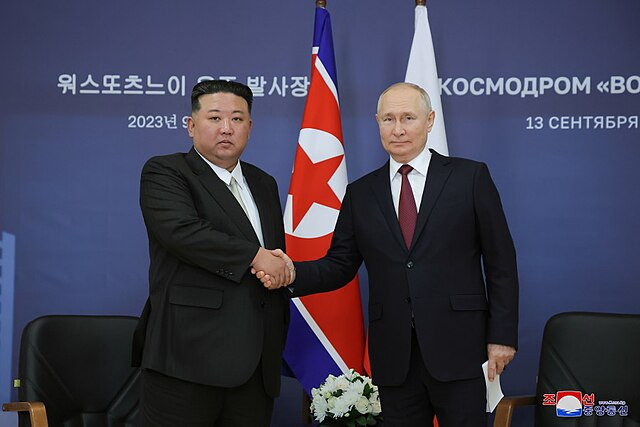Reports of North Korean troops fighting alongside Russian forces in Ukraine have sparked international alarm, with growing fears that Pyongyang's involvement marks a significant escalation in the ongoing conflict. Ukrainian President Volodymyr Zelenskyy asserted that North Korea has become a de facto participant in the war, citing Ukrainian intelligence findings that suggest Pyongyang has transferred both weapons and soldiers to Moscow.
"We see an increasing alliance between Russia and regimes like North Korea," Zelenskyy warned in a speech to Ukraine's parliament. He called for increased support from allies to counter Russia's aggression, including lifting restrictions on Ukraine's use of long-range missiles to strike deep within Russian territory.
The claims of North Korean troops in Ukraine have earned condemnation from the United States, South Korea, and Japan, which have formed a team to monitor arms sanctions on North Korea. South Korea's National Intelligence Service reported that Russian naval ships had transported 1,500 North Korean soldiers to Vladivostok between October 8 and October 13. Meanwhile, South Korea's defense minister, Kim Yong-hyun, suggested it was "highly likely" that North Korean officers had been killed in a Ukrainian strike near Donetsk earlier this month.
Russia, however, has dismissed the allegations. "This seems like yet another fake news story," Kremlin spokesman Dmitry Peskov said, rejecting claims of North Korean military personnel being deployed to assist Russian forces. Despite the denials, some experts believe that North Korean military involvement in the conflict is plausible, given the shortage of manpower that Russia has been facing since launching its full-scale invasion of Ukraine in 2022.
"We cannot rule out the possibility," said Edward Howell, an international relations lecturer at the University of Oxford. "We know that Russia needs manpower." Howell added that even if North Korea is not sending combat troops, it is plausible that Pyongyang could be providing military engineers and personnel to monitor and assist in the use of North Korean weaponry on the battlefield.
The defense cooperation between North Korea and Russia has grown significantly in recent months, culminating in the signing of a mutual defense pact in June 2023 during Russian President Vladimir Putin's visit to North Korea-the first such visit in over two decades. The pact includes a mutual assistance clause, raising concerns that the two nations could be drawn into each other's conflicts. Kremlin spokesman Dmitry Peskov described the treaty as implying "truly strategic deep cooperation in all areas, including security," but refrained from elaborating on whether the pact would entail joint military engagement in the ongoing war in Ukraine.
The United States has expressed concern over reports of North Korean military personnel in Ukraine, but it has not independently verified the claims. General Charles Flynn, the U.S. Army's Asia Pacific commander, noted that North Korean involvement in the war would provide Pyongyang with real-time battlefield feedback on its weapons and tactics, a prospect he described as "very concerning."
The alleged deployment of North Korean troops has also drawn criticism from Western officials, who view the move as an alarming escalation. France's Foreign Minister Jean-Noel Barrot, during his visit to Kyiv, warned that North Korea's involvement would "push the conflict into a new stage, an additional escalatory stage." Ukrainian Foreign Minister Andrii Sybiha echoed these concerns, stating, "There is a big risk of [the war] growing out of its current scale and borders."
Ohio Congressman Mike Turner, chairman of the House Intelligence Committee, called the potential deployment a "red line" for the United States and NATO. In a letter to President Joe Biden, Turner urged the administration to make clear that North Korean troops, either fighting in Ukraine or from Russian territory, must not be tolerated. Turner also requested an immediate classified briefing to address concerns about North Korea's involvement.
In addition to deploying troops, North Korea has reportedly been supplying Russia with significant quantities of weapons since September 2023, including artillery, ballistic missiles, and millions of munitions. In exchange, Russia has provided North Korea with food, cash, and advanced military technology-a crucial asset for Pyongyang, whose leader Kim Jong Un seeks to bolster his regime's nuclear capabilities.
According to South Korea's defense ministry, the deployment of North Korean troops could also serve a symbolic purpose, reaffirming the alliance between Moscow and Pyongyang. "This is a transactional relationship," said Howell. "North Korea provided artillery, and in return, Russia offered food, cash, and military assistance." Howell noted that the relationship had expanded to include not just weapons but also military technology that could aid North Korea in advancing its nuclear and missile programs.
While the presence of North Korean troops remains unconfirmed by the Pentagon, Western officials fear that this alleged cooperation could further destabilize the region. NATO Secretary-General Mark Rutte acknowledged on Friday that, although current intelligence could not independently verify the reports, the organization remained on high alert regarding any escalation involving North Korea.
Despite the growing international concern, Russia and North Korea continue to deny the claims. During a press briefing, Peskov reiterated his stance that reports of North Korean troops on the front lines in Ukraine are "another piece of fake news." Meanwhile, South Korea's intelligence reports indicated that some North Korean soldiers may have already deserted the battlefield, adding an additional layer of uncertainty to the true scope of North Korea's involvement in the conflict.




